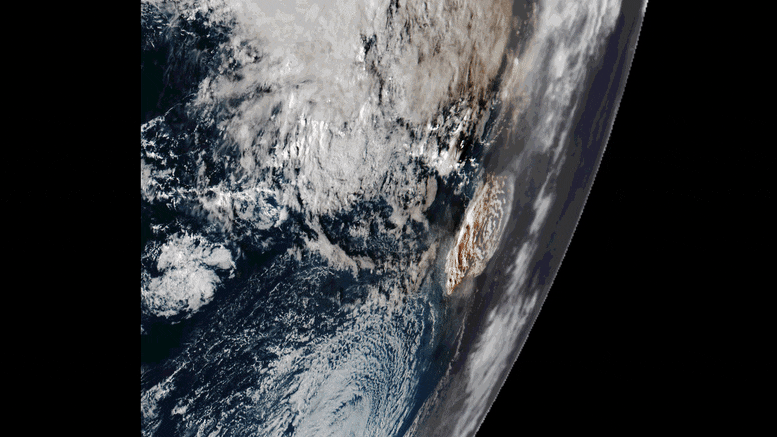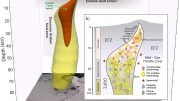
A satellite view of the Tonga volcano eruption.
A fresh analysis of the possible cooling effect of the sulfur dioxide injected into the atmosphere by the Hunga Tonga-Hunga Ha’apai volcano in January 2022 has concluded that the impact will be much smaller than initially thought—but the researchers responsible add some major caveats to this conclusion.
The analysis appears in the journal Advances in Atmospheric Sciences on March 1, 2022.
An undersea volcano at Hunga Tonga-Hunga Ha’apai (HTHH) erupted violently on 15th January 2022, which raised wide public concern about its impact on global climate. Sulfur dioxide (SO2) injected into the stratosphere after volcanic eruptions is oxidized and converted to sulfate aerosols. These aerosols linger there for one or two years and while there, work to reduce incoming solar radiation, resulting in a short period of global cooling.
The surface temperature returns to normal as the volcanic aerosols dissipate, and so a single volcanic eruption is not enough to alter the long-term global warming trend, unless there are clusters of volcanic eruption that can persist through centuries as is suggested have happened during the Little Ice Age in the past millennium.
FY-4B Satellite captured the eruption of Hunga Tonga-Hunga Ha’apai volcano and monitored the diffusion of volcanic ash clouds. Credit: National Satellite Meteorological Center of China
The largest volcanic eruption of the last 500 years, the eruption of Mount Tambora in Indonesia in April 1815 caused the so-called “Year Without a Summer” in the following year in many parts of the world. There is a reduction in annual mean surface temperature over the tropics and northern hemisphere by 0.4-0.8°C (0.72-1.44°F).
But the Tambora eruption emitted 53-58 terrograms (Tg) of SO2. Satellite measurements of the eruption at HTHH—which has erupted multiple times over the past century—showed that its volcanic ash has reached an altitude of 30 kilometers (19 miles) deep into the stratosphere, with a total mass of only about 0.4 Tg.
One previously reported initial estimate placed the reduction in global surface air temperature at between 0.03 and 0.1°C (0.054-0.18°F) over the next one to two years as a result of the HTHH eruption.
“This reported initial estimate may have overestimated the impact as it did not take into account the location where the eruption occurred, which alters the spatial distribution of stratospheric sulfate aerosols—a variable that can alter results substantially”, said Tianjun Zhou of the Institute of Atmospheric Physics at the Chinese Academy of Sciences, “This is because southern hemisphere volcanic eruption emissions are largely confined to circulating in the same hemisphere and the tropics, with less of an impact on the northern hemisphere. This in turn leads to a weaker global cooling than those of northern hemispheric and tropical volcanoes”.
To arrive at a more accurate assessment, modelling needs to take into account the latitude of the release of sulfate aerosols. Correcting for this however was something of a challenge, as there are few southern volcanic eruptions similar to that of HTHH in the historical record. Fortunately, climate-model simulations that use large southern volcanic eruptions in the last millennium overall provided a useful reference. In this way, the researchers found a significant correlation between the intensity of 70 selected volcanic eruptions over the last millennium and the global mean surface temperature response in the first year after eruption.
They then picked six particularly large tropical eruptions in model simulations and scaled the surface temperature response in line with the intensity of the 1991 Mount Pinatubo eruption where 20 Tg of SO2 were ejected. The results of the model simulations were found to be similar to real-world observations, suggesting their modeling work was on the right track.
These results were then scaled down for the HTHH eruption with its stratospheric injection of 0.4 Tg of SO2. The final results showed that that the global mean surface temperature will decrease by only 0.004°C (0.0072°F) in the first year after the HTHH eruption. This is within the scope of internal variability of the climate system.
The cooling in the southern hemisphere will be stronger than in other parts of the world, with the strongest cooling of more than 0.01°C (0.018°F) occurring in parts of Australia and South America. The cooling over most of China will be less than 0.01°C.
This means that the eruption of HTHH will not be strong enough to overwhelm the longer term global warming tendency.
The researchers did include one caveat however to these conclusions: This would be the case if the HTHH eruption is a one-time-only event. No explosive eruptions have been detected at HTHH since the January 15 event so far. However, it may become active again in the future as this volcano has erupted many times over the past 100 years.
“As a result, we should keep monitoring the activity of HTHH in the coming days, months, and years,” said Professor Zhou.
In line with such monitoring efforts, the team will be extending their research by running some experiments based on ideal cases (scenario hypothesis in their simplification, but useful to make the models easier to understand) to try to reveal the potential climate impact of a larger HTHH volcanic eruptions should they occur in the near future.
Reference: “Volcanoes and climate: Sizing up the impact of the recent Hunga Tonga-Hunga Ha’apai volcanic eruption from a historical perspective” by Meng Zuo, Tianjun Zhou, Wenmin Man, Xiaolong Chen, Jian Liu, Fei Liu and Chaochao Gao, 1 March 2022, Advances in Atmospheric Sciences.
DOI: 10.1007/s00376-022-2034-1









The issue with that eruption is the amount of water vapor injected into the Stratosphere. It will cause significant cooling in the Southern Stratosphere and lower pressure which will more than likely effect the northern polar vortex and make the next few winters much more severe.